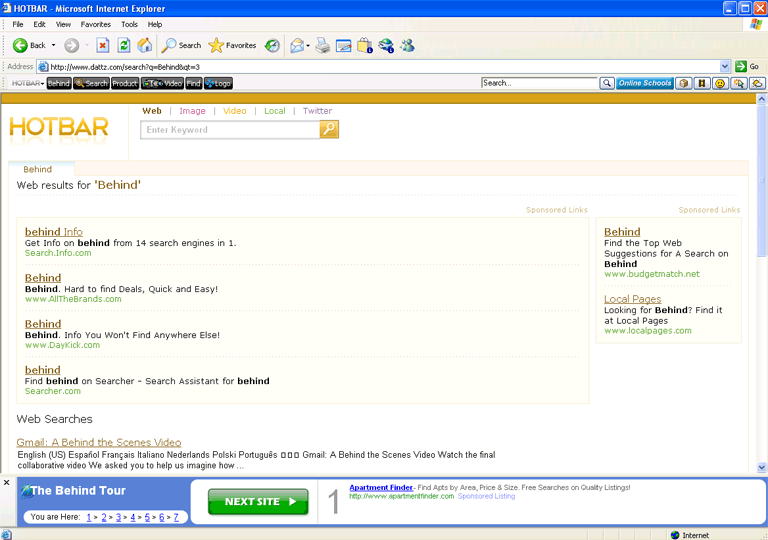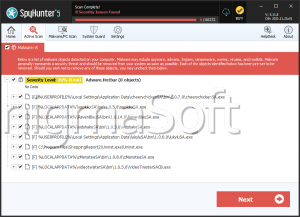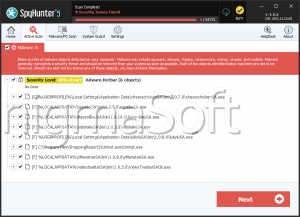Hotbar

Hotbar Image
Hotbar is the name of an especially nasty piece of adware. Although the company that made Hotbar has dissolved and Hotbar is no longer being actively distributed, Hotbar should still be considered dangerous. Although this particular adware is no longer as prevalent as it once was, there may still be bundled downloads or malicious sites that install Hotbar. Also, because Hotbar is so difficult to uninstall completely, it is likely that some computers that were infected with Hotbar in 2010 or earlier may still have some remnants of the adware.
Table of Contents
What Hotbar Was Supposed to Be?
Hotbar provided what Hotbar referred to as targeted advertising. The idea was that Hotbar would track your Internet usage – which sites you visited, what you searched for online, etc. – and based on that information, Hotbar would present you with advertisements that were supposed to appeal to you. The company that owned and distributed Hotbar, which was Zango, claimed that Hotbar would only show advertisements in separate windows or pop-ups and that Hotbar could only be installed with a user's consent. Zango had agreements with merchants who advertised through Hotbar, and with software sites or distributors who would bundle Hotbar with other downloads. Generally, Hotbar was bundled with a download of free software, supposedly as the trade-off or cost to the user for getting the software for free.
What Hotbar Actually Was?
Even if Hotbar was limited to this kind of behavior, as Zango claimed, Hotbar would be annoying adware. Unfortunately, Zango was being dishonest about Hotbar's distribution and behavior, and they continued to promote Hotbar in illegal ways even after the FTC ordered them to stop. Hotbar was installed through drive-by downloads by exploiting ActiveX control settings in Internet Explorer, as well as through what is known as Blackhat Search Engine Optimization (SEO). The way that Hotbar exploited search engines was to use a site that had an address that was very similar to that of a known site, or to copy the appearance of a known website and to cause that fake site to come up very high in search engine results – especially sponsored results. If you were to visit one of these fake or misleading sites, typically you either have been offered a download of something that is free anyway, like Firefox or Google Earth, in exchange for downloading the Hotbar adware. This kind of adware-for-freeware setup is relatively common in sites that offer freeware downloads; so many people are taken in by this particular Hotbar-promoting scam. Alternatively, some of the fake sites would claim to offer a download of something else, and the download would turn out to be for Hotbar.
The problem with Hotbar was not just that Hotbar installed itself without users' consent, or that Hotbar was promoted in illegal ways. Hotbar itself actually put a system's security in jeopardy, as well as invading the privacy of the user of that system. Hotbar is designed to track a user's activity online and transmit back information on the user, which is bad enough. That part of Hotbar's functionality was publicly admitted by Zango. However, Hotbar also downloaded other programs once Hotbar was installed, and malware was very frequently among those other programs. Rogue anti-virus software, in particular, was very commonly downloaded by Hobar. Ultimately, in addition to having these annoying advertisements constantly popping up, users of PCs infected with Hotbar found their computers were also infected with malware as a result.
Where is Hotbar Now?
Zango went out of business in 2009, and they sold Hotbar to a company called Pinball Corp., which continued to promote Hotbar through August 2010. In the summer of 2010, there was an especially high rate of infection with Hotbar, which continued to be promoted in deceptive or malicious ways. Although Pinball Corp. stopped distributing Hotbar, Hotbar is very difficult to uninstall or remove, which means that Hotbar's longevity on infected computers outlived Hotbar's distribution. Hotbar makes so many changes to the Registry and adds so many files, that it is often impossible to remove Hotbar completely without the use of some kind of anti-virus software.
It is in the interest of your security and privacy that if Hotbar is lingering on your PC, remove Hotbar as quickly as possible. Furthermore, if you happen across anything online that asks you to download Hotbar in order to download a program or install a file, make sure that you do not agree to install Hotbar. Hotbar doesn't have anything to offer, and Hotbar can't benefit you to have Hotbar installed.



